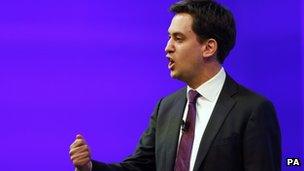Labour: No child benefit for the rich?
- Published
- comments

The Labour leader will declare his support for a cap on so-called "discretionary" welfare spending
When this government decided to cut child benefit from higher and top-rate taxpayers Labour attacked the move as unfair and proving that the government was out of touch with hard-working families.
Now, however, I understand that the party's leadership has concluded that it will not be able to reverse the cut.
To do so would cost 拢2.3bn [Scroll down to update] . That is 23 times as much as the money which would be saved by removing winter fuel allowance from wealthier pensioners - the policy unveiled by the shadow chancellor Ed Balls earlier this week.
Some critics are likely to see this as more evidence that Labour has abandoned its support for so-called universal benefits - those benefits paid to all regardless of income. One source told me "we have other priorities".
Tomorrow Ed Miliband will declare his support in principle for an idea first suggested by the Chancellor George Osborne - a cap on so-called "discretionary" welfare spending, or that part of the benefit bill which is not triggered automatically by a rise in unemployment.
The chancellor first floated the idea of a cap in his last Budget. He said he would spell out how it would work in the spending review at the end of this month. His aim was to set a political trap for Labour. Ed Miliband is now trying to escape that trap.
Technically, the Treasury is examining a cap on some of what's called AME spending.
That's what's classified as Annually Managed Expenditure - ie the roughly 50% of public spending which is not currently subject to the annual cuts negotiated between Whitehall departments and the Treasury (what's classified as DEL or Departmental Expenditure Limits).
Almost all welfare spending, debt interest and Britain's contributions to the EU are classified by the Treasury as beyond their day-to-day control because, for example, they cannot determine the level of unemployment, interest rates or the outcome of EU negotiations.
Whatever your politics, the argument for a cap on discretionary welfare spending - or much of what is defined as AME - is that it forces governments to spot and deal with with unplanned increases in welfare bills which are not caused by a recession.
Incapacity benefit, housing benefit and Disability Living Allowance all ran out of control in the past few decades under governments of both left and right.
Labour's willingness to embrace the idea - at least in principle - is a further sign that the party is trying to restore its economic credibility by proving that it has the will to curb spending. The Conservatives will respond that it is deeds and not words that really count.
Of course, a welfare cap won't in itself curb welfare spending. What will is difficult decisions to cut the cost of particular benefits.
The coalition cannot agree on the next set of welfare cuts - there will be no more laid out in the spending review.
Labour has yet to spell out any - beyond one which will save around 1,000th of the projected annual deficit at the time of the next election. Tomorrow we will see if Ed Miliband goes any further.
Update: Treasury have confirmed 拢1.8bn to me as the child benefit figure for the present government policy.
The 拢2.3bn figure refers to the original policy they announced in 2010 - where they were doing it for all higher-rate taxpayers.
You'll remember they subsequently adjusted it - introducing a taper instead of the cliff edge, meaning some higher-rate taxpayers did receive some of it - and so the saving decreased to 拢1.8bn.